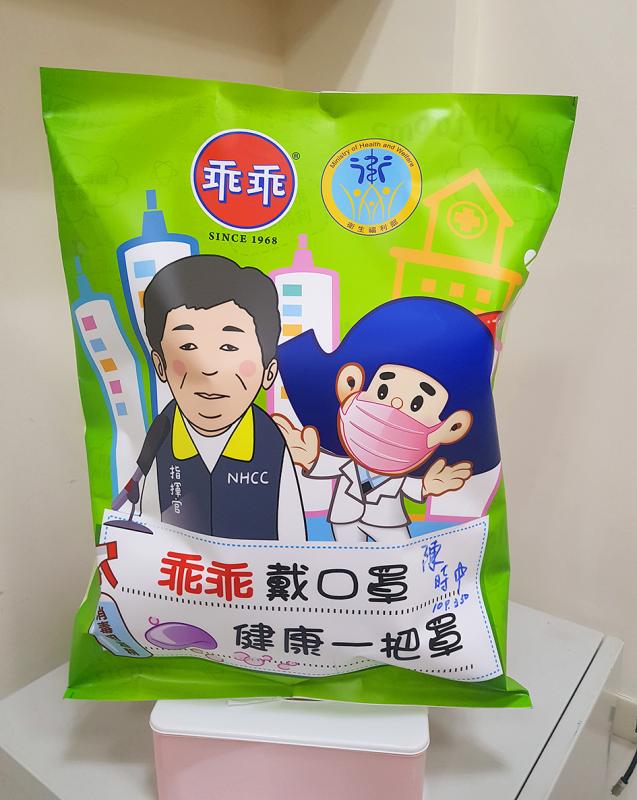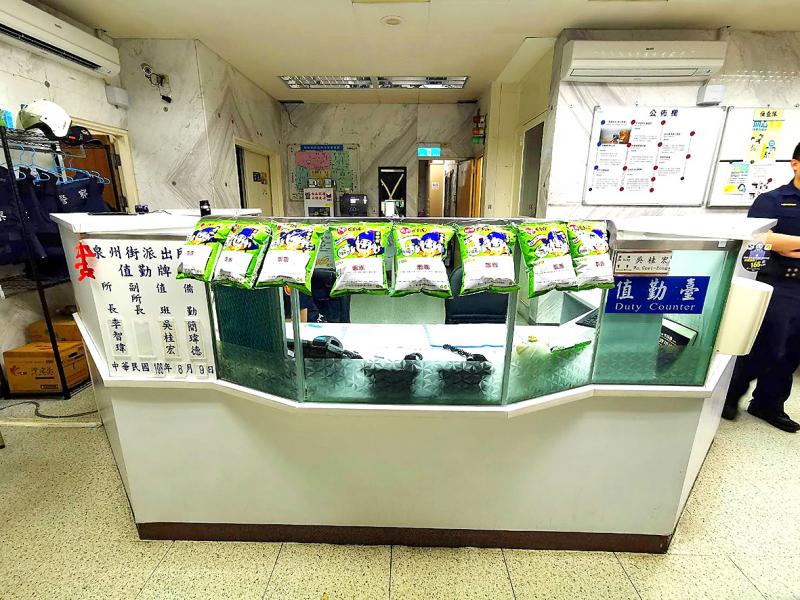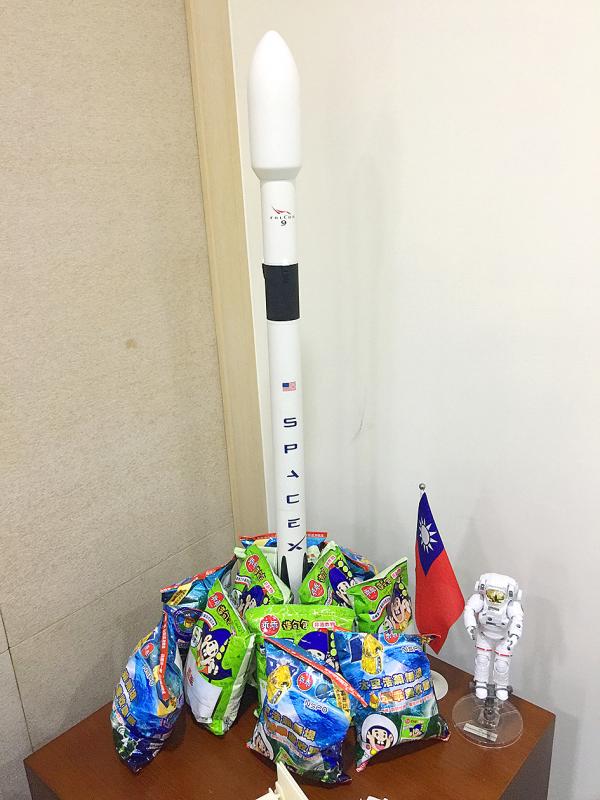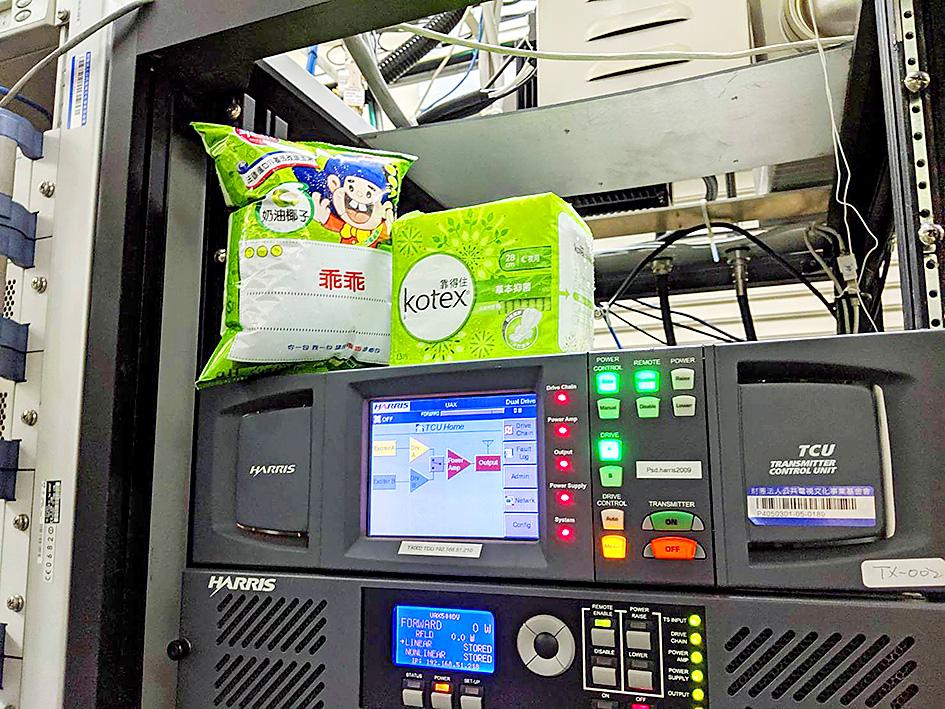A savory snack has become all the rage with Taiwan’s IT crowd because they believe it can bewitch wayward tech — whether disobedient desk top computers, intractable servers or ill-mannered ATMs.
Green bags of coconut butter-flavored Kuaikuai (乖乖) are the go-to prophylactic because they possess magical power that ensures machines won’t break down.
“They never malfunction,” says a computer engineer from the Liberty Times, the sister paper of the Taipei Times, as we wander around a frigid room that holds dozens of computer servers – and over a dozen bags of Kuaikuai. “And that’s the reason why [we use them],” he says, gesturing towards the shiny green bags emblazoned with a pirate mascot.

Photo: Noah Buchan, Taipei Times
Facing the server room are several rows of workstations, green bags of the Kuaikuai in various sizes resting beside keyboards or on top of hard drives.
“Everyone in the IT industry uses them to protect our high tech, especially servers and hard drives,” he says. “You only need to replace them when their expiry date runs out.”
And what was once a geek subculture has today gone mainstream — there is even a Wikipedia entry for it called “Kuaikuai culture” (乖乖文化). Researchers at Academia Sinica, Taiwan’s top research institute, for example, place bags of Kuaikuai in their labs; nurses tape them to respirators and other life-saving devices to ensure that they don’t break down; and museums place them next to sound systems so that announcements will go off without a hitch.

Photo: Liu Ching-hou
More than just a meme, passing fad or good luck charm, the belief that the snack keeps tech running smoothly and provides protection offers a window into how folk traditions dating back to antiquity continue to evolve in technologically-advanced Taiwan. In fact, the product resonates so strongly as a talisman, there are now knock-offs such as “Especially Kuai” (特別乖).
’KUAI KUAI CULTURE’
It’s difficult to exaggerate the ubiquity of the product and its perceived power to protect tech. Indeed, its efficacy is such that it has filtered down into all sectors of society as a powerful form of messaging.

Photo: CNA
When former Premier and Minister of Science and Technology Simon Chang (張善政) announced last summer that he was running for president, he posted on Facebook that he had the support of Kuaikuai.
“Kuaikuai wants me to run,” wrote Chang, who holds a Phd in civil and environmental engineering from Cornell University. “Engineers shouldn’t be absent from the race.”
(Chang later dropped out to team up with then-Kaohsiung mayor and Chinese Nationalist Party (KMT) presidential candidate Han Kuo-yu (韓國瑜). The ticket placed a distant second behind President Tsai Ing-wen (蔡英文), the incumbent for the Democratic Progressive Party.)

Photo courtesy of the Nantou County Government
Politicians are not the only ones who use Kuaikuai to project a message. Police hang oversized bags of the stuff in their precincts because, as an officer at a Neihu District (內湖) station told me, “they ward off evil and protect our officers.”
Government and big industry also see the snack’s protective value. Before the August 2017 launch of Taiwan’s historic Formosat-5, the first locally-developed satellite, the technical team working on it placed several bags of Kuaikuai at the base of a mock Falcon 9, the rocket that would launch the satellite into space. It went off without a hitch.
As with many beliefs surrounding magic, techies say that Kuaikuai possesses tangible properties that ensure it will maintain tech. The first is the name of the product. One of the first words that any child in Taiwan will have learned is guai (乖, the company uses a different Romanization system for the Chinese character). It means “to be obedient.” A child crying on the MRT is cooed with “guai, guai;” a dog that is being aggressive in Daan Forest Park will be told by its master to be “guai.” In short, to be guai is to be obedient — thinking that applies to tech.
Taiwanese share a common belief that Chinese characters possess magical power, which influences a person’s fate. Billions of dollars are spent on the practice every year, with experts drawing on ancient wisdom to improve a person’s fate so as to ensure good health and prosperity. The character for guai possesses this kind of magical property.
And while the notion that Chinese characters are imbued with magical power dates back to oracle bones in ancient China, the mechanism that portends green as an auspicious color is eminently modern.
Green is associated with traffic lights or the green light on a computer, signifying that everything is flowing smoothly. An amber light, of course, signifies that the computer is in sleep mode or, worryingly, might soon crash, which is why bags of red and yellow Kuaikuai are kept far away from computers (though bags of yellow and red Kuaikuai are used in different contexts for, respectively, wealth and love).
Curious to know if the practice resulted from a marketing campaign started by the company, I spoke to its general manager, Irene Liao (廖宇綺), whose father and grandfather started the company over 50 years ago.
“No one can explain how it came about because honestly no one knows. I had to go online and Google [it]... Apparently there was a student working on his Master’s thesis and he was having problems with his computer. So he came up with the idea that taking a bag of green Kuaikuai and putting it on the computer [so] that it would function well, [and] he could finish his paper,” Liao says.
In fact, there are many origin stories. In researching this story, the earliest news item I found about the practice is from a 2008 United Daily News article that documented engineers placing a bag of Kuaikuai into an ATM. Another engineer at the Liberty Times said that the tradition dates back decades, with his uncle using it for hand-held calculators. Apocryphal as these stories seem to be, people are united in the product’s efficacy.
MARKETING MIRACLES
Kuaikuai’s success as a protector of tech stems from its seamless integration of a variety of existing folk beliefs and practices that encapsulate many quintessentially Taiwanese phenomena: convenience in a country whose export economy relies on high-tech and whose citizens believe in the potency of magic as expressed by the common practice of sourcing talismans and amulets from temples for protection and good luck. When a temple’s deity earns a reputation as having power, mainstream and social media disseminate this news, boosting the temple’s popularity in a feedback loop.
Take Tzunangong (紫南宮) for example. The small temple, located in rural Nantou, is dubbed “god’s bank” because its Earth God (土地公) offers loans of “lucky money” (發財金). After providing the temple with personal information, worshipers make a request to the Earth God and then return home with a red envelope filled with six NT$100 bills, which the Earth God has infused with the kind of magic that has the power to bring riches or good health.
Tzunangong director Chuang Chiu-an (莊秋安) said one worshiper repaid the Earth God 1,000 percent interest, after his real estate business boomed when he borrowed money from the temple.
“As he returned home [with his lucky money] he received a phone call from his wife ... who said that they had just sold five properties. The contractor later repaid us NT$600,000,” he told the Chinese-language Eastern Financial News.
Chuang said that the largest amount ever repaid in his 16 years as head of the temple is NT$2.9 million.
And like Tzunangong, Kuaikuai is clearly making a bundle off the dissemination of these stories and the perceived efficacy of the product. Liao says that the company doesn’t keep track of how much sales result from the practice, but anecdotally estimates it could be as high as 30 percent.
“Of course, we hope that that’s not the case because consumers should buy the product because it’s tasty,” she quips.
Figures for Tzunangong, on the other hand, are easy to come by.
Chuang’s stories of believers’ success ensure a steady stream of media attention, especially around the Lunar New Year. It’s a narrative of magic and miracles that Kuaikuai was fortunate to tap into. Similar to the media endlessly reporting on temples like Tzunanagong, so too has there been a litany of reports about the efficacy of Kuaikuai to protect tech.
TALISMANS APLENTY
From yellow strips of paper emblazoned with magical spells to hard-boiled eggs dyed pink and emblazoned with pingan (平安, “peace”), the tradition of visiting a temple and returning home with talismans to protect ancestors and descendants is also an ancient practice. Kuaikuai is a textbook example of how folk traditions evolve as they are passed down from generation to generation.
Up until the end of World War II, Taiwan was a mostly agricultural society, tied to the land and hearth, with temples serving as the center of the community. The 21st century sees most Taiwanese in urban centers sitting in front of a desk and working away on a computer, so it seems natural that agrarian folk practices such as procuring amulets and talismans from temples to protect family and farm, would evolve into the commercialization of the practice in the form of buying a bag of Kuaikuai from a convenience store to protect tech.
It’s difficult to exaggerate how common the practice is. It doesn’t matter if you are a legislator, a police officer, a scientist or a businesswoman, there is a shared understanding within Taiwanese society that the snack possesses magic. And this collective understanding is most notable when there is a national outpouring of grief, as when a three-year old young girl, nicknamed Little Lightbulb (小燈泡), was decapitated with a fruit knife in 2016 by a mentally unstable man.
Amid candy and flowers, candles and clothing, and following a tradition that offers objects that the deceased will want in the next world, are bags of Kuaikuai emblazoned with messages of good will.
“You are no longer in pain,” one writes on a bag at the spot where the murder took place. “You are an obedient angel. The future will be better.”
Or when TSMC’s factory in Tainan shut down. They made a limited edition series that were given to thank the engineers, which now sell online for NT$500, significantly more than its NT$40 retail.
But for the most part, the snack is used to stop problems before they start. And foreign companies are getting in on the act.
When German amusement park Europa Park announced its collaboration with Taiwanese game equipment company Brogent Technologies Inc (智崴資訊), a manufacturer of theme park rides and flying theaters, a bag of Kuaikuai was front and center at the press conference.
“This is a special tradition in Taiwan,” the company said.

Jacques Poissant’s suffering stopped the day he asked his daughter if it would be “cowardly to ask to be helped to die.” The retired Canadian insurance adviser was 93, and “was wasting away” after a long battle with prostate cancer. “He no longer had any zest for life,” Josee Poissant said. Last year her mother made the same choice at 96 when she realized she would not be getting out of hospital. She died surrounded by her children and their partners listening to the music she loved. “She was at peace. She sang until she went to sleep.” Josee Poissant remembers it as a beautiful

Before the last section of the round-the-island railway was electrified, one old blue train still chugged back and forth between Pingtung County’s Fangliao (枋寮) and Taitung (台東) stations once a day. It was so slow, was so hot (it had no air conditioning) and covered such a short distance, that the low fare still failed to attract many riders. This relic of the past was finally retired when the South Link Line was fully electrified on Dec. 23, 2020. A wave of nostalgia surrounded the termination of the Ordinary Train service, as these train carriages had been in use for decades

March 2 to March 8 Gunfire rang out along the shore of the frontline island of Lieyu (烈嶼) on a foggy afternoon on March 7, 1987. By the time it was over, about 20 unarmed Vietnamese refugees — men, women, elderly and children — were dead. They were hastily buried, followed by decades of silence. Months later, opposition politicians and journalists tried to uncover what had happened, but conflicting accounts only deepened the confusion. One version suggested that government troops had mistakenly killed their own operatives attempting to return home from Vietnam. The military maintained that the

Lori Sepich smoked for years and sometimes skipped taking her blood pressure medicine. But she never thought she’d have a heart attack. The possibility “just wasn’t registering with me,” said the 64-year-old from Memphis, Tennessee, who suffered two of them 13 years apart. She’s far from alone. More than 60 million women in the US live with cardiovascular disease, which includes heart disease as well as stroke, heart failure and atrial fibrillation. And despite the myth that heart attacks mostly strike men, women are vulnerable too. Overall in the US, 1 in 5 women dies of cardiovascular disease each year, 37,000 of them